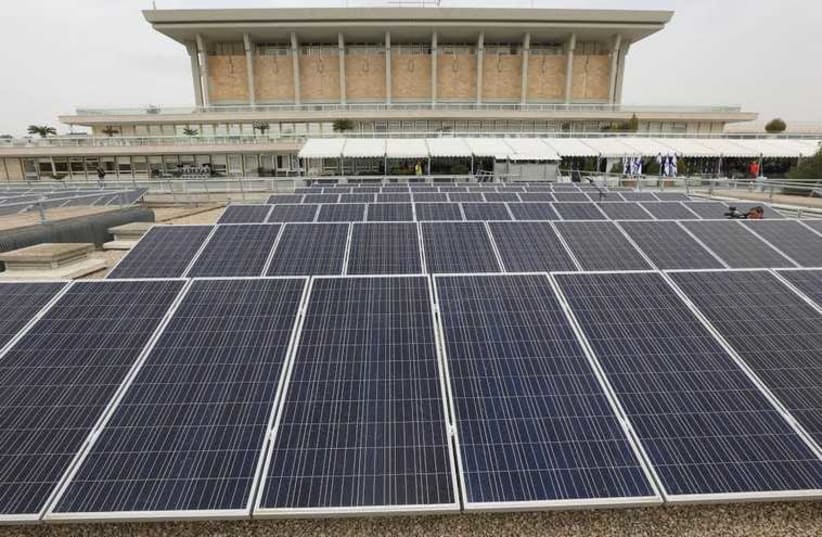See the latest opinion pieces on our page
“For from Zion will go out the law of green energy” the speaker declaimed.With these words, the speaker connected his personal vision with that of the prophet Isaiah – “For from Zion will go forth the Torah and the word of the Almighty from Jerusalem.”In contrast to utopia, which allows itself to stress ethical values by looking into a future that is not necessarily realistic, the visionary usually relies on a deep understanding of the reality and the wish to reach a better future within a reasonable period of time in the life of a man or the life of a nation.A man can develop a vision for himself or for future generations, usually the generation nearest to him in time. A prophet can forecast a vision of 2,000 years for an existing nation that he hopes will live forever.According to the vision of Isaiah just mentioned, there will come a day “when man will throw away the gods of silver and the gods of gold” and people will cease fighting over a piece of land.In that day, which we hope will not be too distant, the “nation will not lift up its sword against another nation and will cease to learn war,” and “they will beat their swords into plowshares and their spears into pruning hooks.”The vision of Isaiah is even greater. The nations will not only keep away from war, from the point of view of “keep from evil,” but also seek a suitable ethic that they are able to live by, from the point of view of “doing good.” This will be at the end of time.“And it shall come to pass in the last days, that the mountain of the Lord’s house shall be established on the top of the mountains, and shall be exalted above the hills, and the nations will flow unto it. And many people shall go and say, come, and let us go up to the mountain of the Lord, to the house of the God of Ya’acov; and he will teach us of his ways, and we will walk in his paths; for from of Zion shall go forth the Torah and the word of the Almighty from Jerusalem.”It is with this ethic that the Knesset speaker is associated.The previous century was characterized by the essential development of mankind with regard to the environment.Today, mankind understands that in the past few centuries it has with its own hands destroyed the good earth on which it dwells.In fact, since the 1970s, man has exploited the natural resources beyond the ability of nature to regenerate and has thus produced an “overdraft” in the requirement of those resources.One phenomenon that stands out in particular since the beginning of the Industrial Revolution in England in the 18th century is the fact that man has changed into “a species that burns, only more so.”Prof. Danny Rabinowitz, an outstanding environmental philosopher, has even invented a new term for this burning species – “Homocombustans.”At first, steam engines were fed logs of wood from forests that were chopped down, then man looked for any sort of combustible material with which to feed the furnaces that produce energy. The result has been greenhouse gases that cover the world, heating it, causing climate changes and melting the polar ice.Climate change is the most serious environmental crisis that mankind has had to face, already for decades. The main way it is dealing with this problem is the reduction of the level of carbon by every organization. The use of energy has to be more efficient, using renewable energy and lessening of the need for energy – that is the name of the game.For this reason, when Edelstein gave instructions for formulating the Green Knesset program, the instruction of Knesset director-general Ronen Plot was that the first steps of the program should focus exactly on these subjects – energy efficiency and the production of energy from a renewable source.The vision of the Knesset speaker is to demonstrate that it is possible to reduce the needs for energy. This is not only the correct procedure from an ethical point of view, but it is also a process that is economically worthwhile for an organization, as has been demonstrated by the economic analysis of various projects.The Green Knesset deals not only with the introduction of environmental technology into the heart of the Knesset, but also the instruction of the Knesset workers, MKs and visitors who come within its precincts.The Knesset speaker and the director-general do not stop there; the project goes beyond these boundaries. Last year, they placed emphasis on meetings with parliaments in distant countries with the aim of increasing the world’s parliamentary discourse in the field of sustainability. These efforts have born fruit and agreements have been signed with five countries – Ethiopia, Kenya, Uganda, Romania and Albania.At this time, the Knesset speaker is inaugurating the biggest solar field of any parliament in the world. This in principle is a symbolic act, symbolizing the ability of mankind to contend with the results of its misdeeds and to repair them.This enables the development of a responsible approach that will be rewarded one day, so that man can live in harmony with his fellow men as in the vision of Isaiah, but also in harmony with his environment that has undergone the process of “tikkun olam,” putting the world aright.The writer is the sustainability coordinator in the office of the director-general of the Knesset and directs the Green Knesset project.
The Green Knesset: A vision of Tikkun Olam
At this time, the Knesset speaker is inaugurating the biggest solar field of any parliament in the world.
